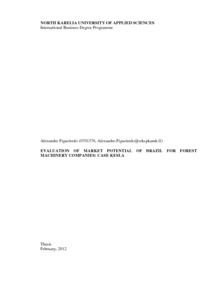EVALUATION OF MARKET POTENTIAL OF BRAZIL FOR FOREST MACHINERY COMPANIES: CASE KESLA
Figueiredo, Alexandre (2012)
Figueiredo, Alexandre
Pohjois-Karjalan ammattikorkeakoulu
2012
All rights reserved
Julkaisun pysyvä osoite on
https://urn.fi/URN:NBN:fi:amk-201203062852
https://urn.fi/URN:NBN:fi:amk-201203062852
Tiivistelmä
Biomass is one of the sources for energy production with the greatest potential for growth in Brazil. It is considered one of the main alternatives to diversify sources of energy and consequent reduction of dependence on fossil fuels. Brazil is a country rich in forests, having 35 % of the native forests in the world. Brazil is also the largest producer of tropical wood and the fifth-largest industrial wood producer. Particularly the use of wood chips for energy generation has been growing in Brazil due to the interest of the Brazilian government to explore its natural resources and the continuous expansion of reforested Eucalyptus plantation areas. Brazilian economy has been growing at a rate of 4 % a year over the past eight years making it the largest economy in Latin America. The economic success of Brazil has been attracting investments from developed markets, which have risen up the exchange rate of Brazilian currency Real against the US Dollar thus making it easier for Brazilians to afford expensive machinery. Kesla Oyj is a Finnish manufacturer of forest machinery interested in entering the Brazilian bioenergy market. The purpose of this study developed on behalf of Kesla Oyj is to have an overview of the Brazilian wood chip market and to identify the best entry mode to be applied there. This study is based on interviews in Brazil, visiting companies, manufacturers and forest plantations in Brazil, and also on work experience at Kesla with professional colleagues. The study is also based on a thorough overview on the relevant, recent and up-to-date literature including books, scientific articles, company reports and administrative documents. This study revealed that the wood chip market in Brazil is active and potential for foreign investors. However, high import tariffs imposed by Brazilian authorities over manufactured goods are the main obstacle for Kesla Oyj to enter the market by its common entry mode, indirect exporting. The best options would be partnership with a strong dealer or a local manufacturer who could wholly or partially produce Kesla’s products to avoid the high tariffs.
